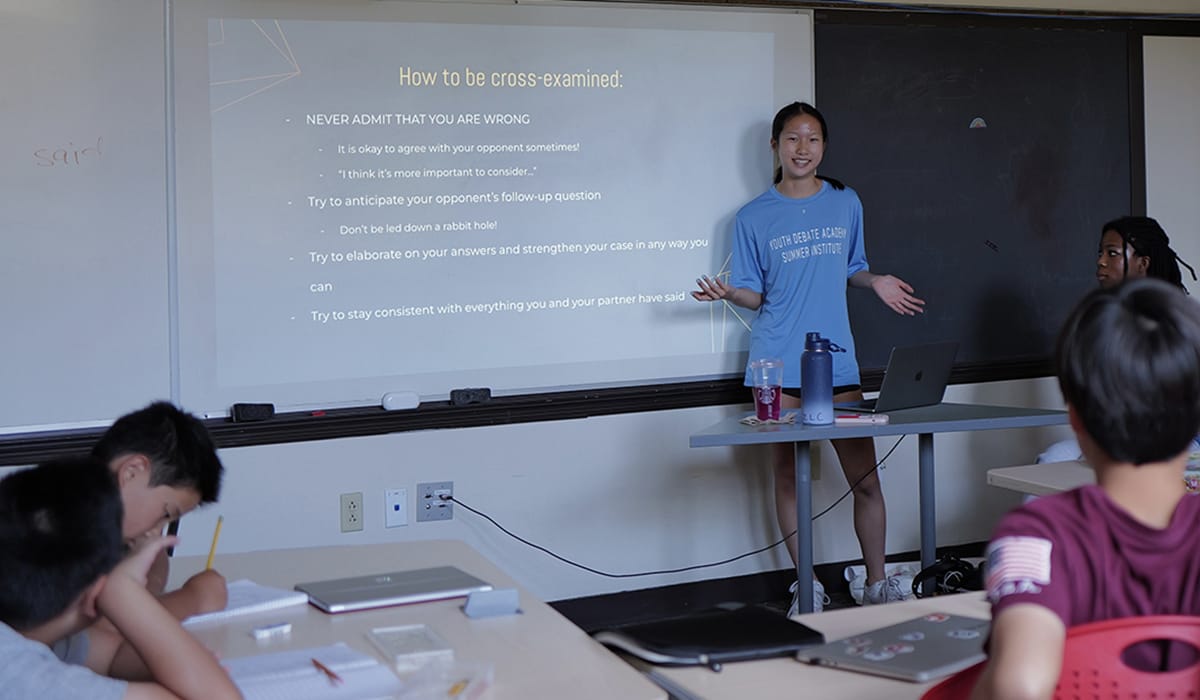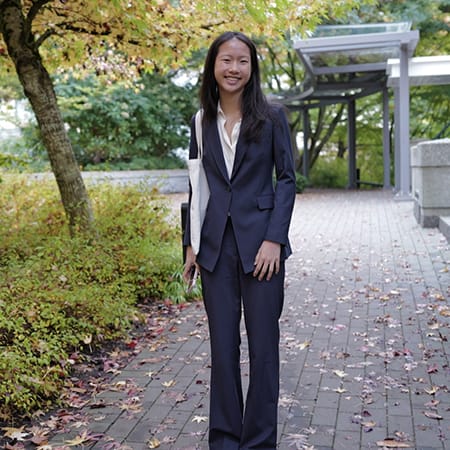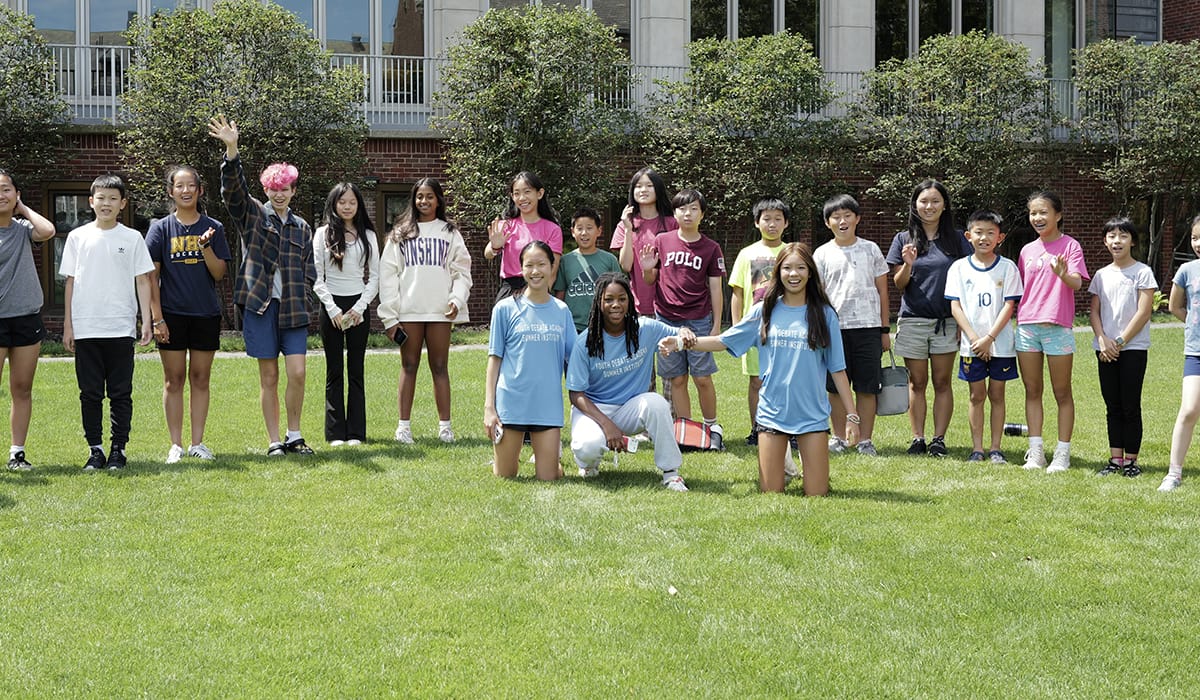Using Undebatable Skills to Empower Youth in Public Speaking

Meet Daily Point of Light Award honoree Emily Zhang. Read her story and nominate an outstanding volunteer or family as a Daily Point of Light.
Emily Zhang, now 17, was a quiet middle schooler whose voice was becoming lost amongst the outgoing when she discovered the power of debate after watching one of her older brothers at a camp. She was awestruck at the ability to capture attention and the power of persuasion. She tried it out, and eventually became the president of her high school Speech and Debate team, competing on both regional and international levels. Last year, she was named International Champion of Impromptu Speaking at a tournament in Vancouver and took 8th overall as part of the US National Team at the World Individual Debating and Public Speaking Championships in Australia.
With newly built eloquence and confidence, she decided to help others find similar skills by creating Youth Debate Academy (YDA), an organization offering free online and in-person programs for other first-generation middle school students, programs that have now reached over 700 people. She has personally offered over 400 hours of free instruction. Virtual programs have attracted students from all over the world, and the group launched the first in-person Summer Institute in Boston last August, to much success. Emily’s efforts have also secured the support of the community, including over $100,000 in donations and corporate grants in the past year to continue this life-changing work.

What inspires you to volunteer?
I’ve always been motivated by this idea of creating a world that I want to live in and am proud to be a part of. What inspired YDA was how much I’ve personally gained from participating in speech and debate. It’s made me a person who’s able to better express herself. A recent study showed that students who debate are 1.8 times more likely to graduate high school. Our goal isn’t necessarily creating the next world champion in debate, but inspiring a generation of students who are able to confidently express their thoughts and advocate for the people around them.
What got you interested in debate?
Growing up, I was a shy kid. I found it difficult to express myself. I was often spoken over by my classmates, and little by little, I just started talking less. In fourth or fifth grade, my older brother was at a debate camp, and on the last day, they let family members watch a showcase round. I was awestruck watching them voice their opinions and engaging with each other’s arguments in a meaningful way.
When I first joined Speech and Debate in the summer after sixth grade, people listened to me because they had to, but as I practiced, people started listening to me because they wanted to. The skills that I learned from speech and debate—critical thinking, efficient researching and effective communication—will follow me for a lifetime.
Tell us about your volunteer role with Youth Debate Academy.
I’m the founder and president. I organize our free online and in-person speech and debate programs for recently immigrated middle school students. We’re committed to providing every student with personalized instruction from our team of student instructors.
I also collaborate with executives from the Boston Debate League, Jack and Jill of America and local public schools to expand our reach and negotiate donations and grants. Lastly, I manage our team of student instructors who do the critical work of teaching 700+ students, managing our social media, communicating with families and much more.
What inspired you to get started with this initiative?
I started YDA in March of 2021, when I was in eighth grade. I was sitting at lunch with my mom and said, “Wouldn’t it be cool if…?” My mom agreed, and that weekend, I locked myself in my room and put together a schedule.
What are your long-term plans or goals for the organization?
The long-term vision for YDA is creating a generation of students who are inspiring the people around them to become more effective speakers and communicators themselves. Oftentimes, when a students graduate from our program, they’ll come back and become instructors. We’ve also had graduates interested in opening more branches of the in-person program, and that’s something that we’re really looking to expand in the future.

What’s been the most rewarding part of your work?
What’s really motivating is not seeing students become better at debate, but seeing them more willing and excited to use their voices. At our first summer program on Zoom, there was a girl who was shy, and her parents had voiced concerns about her reluctance to participate in classes and social settings. Now, she’s an active member of her school’s debate team. She’s joined the YDA team as a counselor and instructor, and we still stay in touch.
Growing up seeing ads on TV and watching celebrities be praised for their charitable work and donations, it seemed that volunteering was really one-sided. There was always a giver and receiver. But that’s not the case. Working with students with unique perspectives and experiences, I’ve learned so much and considered various topics in ways that I never have previously. We’re all learning and working hard to get better.
Tell us about upcoming partnerships, programs or events you’re excited about.
This fall, Youth Debate Academy is collaborating with the Pan American Ethics Olympiad to offer students free training for the Ethics Olympiad, a regional and international tournament founded on philosophical debates regarding real world ethical dilemmas. It’ll be an amazing opportunity for students to apply their public speaking and debating skills in a different setting, and to learn more about philosophical concepts.
Do you have any tips for new debaters?
Just do it. The very first time I gave an impromptu speech, I got up in front of a roomful of judges and competitors, and I said absolutely nothing. It can seem like speaking or debating is something that you’re inherently good or bad at, but just like anything else, it’s a skill to be developed. There has to be at least some part of that process that you might not be particularly good at. You practice and you get better.
What do you want people to learn from your story?
Go out in the world, identify something that you care about and do whatever you can to get it. I didn’t have everything figured out when I first started the organization, and there have been many lessons I’ve learned along the way. There are so many possibilities if you just go out and find—or create—them.
Do you want to make a difference in your community like Emily? Find local volunteer opportunities.